https://www.nektariaanastasiadou.com/politika
by Nektaria Anastasiadou

σαλκίμι/salkími
Istanbul Greek Idiom #1: Whereas wisteria is called γλυσίνα/glysina in Athens, in Istanbul (as well as in many parts of Greece outside Athens), we call it σαλκίμι/salkími, borrowed from the Turkish salkım.

κεντιανό/kendianó
Istanbul Greek Idiom #2: Whereas the Athenian word for snack is κολατσιό/kolatsio (from the Italian colazione, meaning breakfast), in Istanbul we call our afternoon snack κεντιανό/kendianó, because it is eaten near the time of the Muslim Turkish ikindi prayer. The afternoon is likewise called κεντί/kendí.

Κουλάς/Koulás
Istanbul Greek Idiom #3: The Galata Tower is the Πύργος του Γαλατά/Pyrgos tou Galata for Greeks, but for us it is simply the Κουλάς/Koulás, from the Turkish kule. Ladino also uses the same word, Kula, for the monument of this traditionally Jewish neighbourhood.

νταλγκάς/dalgás
Istanbul Greek Idiom #4: Dalga means wave, temporary love affair, and reverie in Turkish; in Istanbul Greek, νταλγκάς/dalgas means wave or obsession; in Greece, the same word (but sometimes spelled νταλκάς/dalkas) is used for longing and unrequited love.

νάτο κεφάλι νάτο μερμέρι/nato kafa nato mermer
Istanbul Greek Idiom #5: An expression that I use daily for my stubborn Karadenizli husband is νάτο κεφάλι νάτο μερμέρι, which passed into Turkish as nato kafa nato mermer. Literally: “here is the head, here is the marble.”

κουμάσι/kumási
Istanbul Greek Idiom #6: the word κουμάσι/kumási creates confusion in Greece, where it is used for both chicken coops and crooks. In Istanbul, we know that they come from two different Turkish words: kümes for coop and kumaş for cloth (a crook is made from bad cloth/material).

τράχωμα/tráhoma
Istanbul Greek Idiom #7: Τράχωμα/tráhoma means dowry in our idiom. It is a Byzantine Greek word that passed into Turkish & Ladino as drahoma. In Greece, however, the “dowry” meaning has been forgotten; and its homonym τράχωμα/trachoma refers to the eye disease trachoma.

Αρμένικη βίζιτα/Arméniki vízita
Istanbul Greek Idiom #8: Αρμένικη βίζιτα/Arméniki vízita/Armenian visit is what we call the situation where the guests stay too long and don’t seem to have any intention of leaving. I’ll let my Armenian friends explain why.

σικτίρ πιλάφι/siktír piláfi
Istanbul Greek Idiom #9: Σικτίρ πιλάφι/siktír piláfi (f%@#-off pilav) is the last treat that you serve when you are tired of your guests and want to hint that they should leave. In the past, a sweet rice pilav was served to guests at Rum weddings as a sign that the party was over.

καβάφης/kaváfis
Istanbul Greek Idiom #10: Καβάφης/kaváfis, famous as the surname of the great poet Cavafy, is the Istanbul Greek word for a cobbler of second-rate shoes or for a person who does shoddy work (loan from Turkish word kavaf). Alas, not a fitting surname for the perfectionist poet.

αγιάζι/ayázi
Istanbul Greek Idiom #11: Αγιάζι/ayázi: humid, piercing cold, especially on winter nights & early mornings (from the Turkish ayaz, which refers to dry cold). Although used in Greece as well, there is no place like Istanbul to understand the true meaning of ayazi.

σαρδελιά/sardeliá
Istanbul Greek Idiom #12: Geranium (γεράνι/yeráni in Greece) is σαρδελιά/sardeliá in Istanbul & Cretan Greek, τσαρτελλούιν/tsartellouin in Cypriot Greek and sardunya in Turkish. The word may have Greek origin and some connection with the Ancient city of Sardis (modern Sart).

σαρμασίκι/
sarmasíki
Istanbul Greek Idiom #13: Ivy, called κισσός/kissós in Greece, is σαρμασίκι/sarmasíki in Istanbul, from the Turkish sarmaşık. Sarmasiki is also the name of a nearly forgotten Rum parish/neighborhood south of Edirnekapı. (In photo: sarmasiki in our dear Yeniköy/Νιχώρι).

ντρίτος/drítos, ακατρεπάγκλ/à quatres épingles, τρίγκα/trínga
Istanbul Greek Idiom #14: Dressing well is traditionally important in Rum culture & evidenced by the many words we have for “dressed to the nines,” including ντρίτος (from Italian diritto), ακατρεπάγκλ (from French à quatres épingles) τρίγκα/tringa (possibly from French fringué).

σκόρδα/skorda
Istanbul Greek Idiom #15: When you’ve done something commendable or are just looking fabulous and we don’t want to give you the evil eye, we say σκόρδα/skorda/garlic! Or σκόρδα νά ‘χεις! May you have garlic! Which will of course avert the evil eye.

μάνι-μάνι/mani-mani
Istanbul Greek Idiom #16: Μάνι-μάνι/mani-mani is a favorite Istanbul adverb, used sometimes also in Greece, meaning “quickly” (from Italian mena le mani). In the video, the guys at the Mehmet Efendi counter in Eminönü wrap freshly ground coffee μάνι-μάνι/mani-mani.

Πόλη/Póli
Istanbul Greek Idiom #17: Formerly Byzantium, New Rome, Constantinoupolis, Kostantiniyye; today Istanbul; but if you ask an Istanbul Rum where he is from, he will reply “the Πόλη/Poli/City” because there is only One and no others compare.
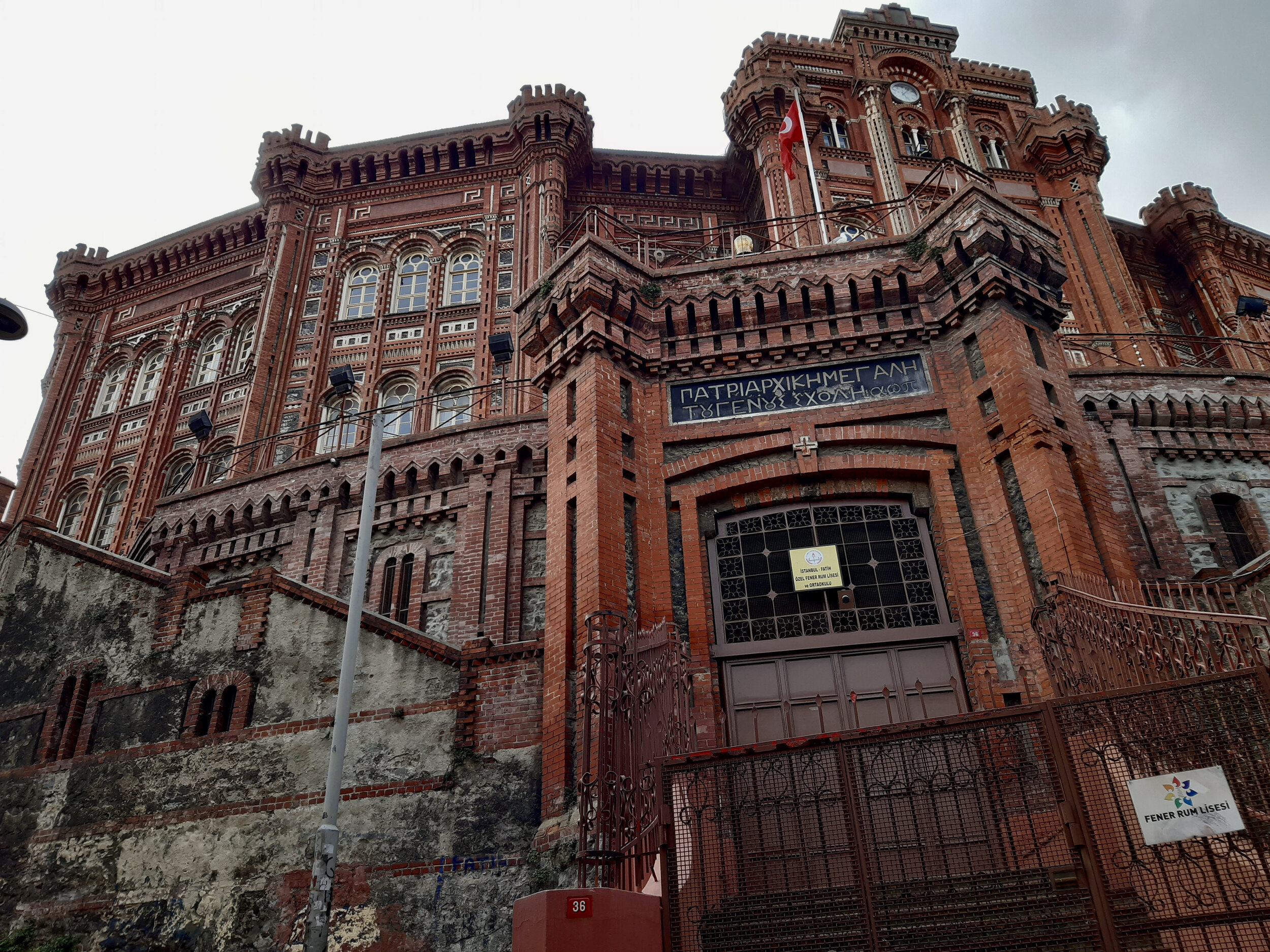
Ρωμιός/Romiós (m) Ρωμέισσα/
Roméissa (f)
Istanbul Greek Idiom #17: Ρωμιός/Romios (m) Ρωμέισσα/Romeissa (f) was a citizen of the Byzantine Emp. & an Orthodox Christian of the Ottoman Emp.; today an Orthodox Christian of Turkey (Rum in Turkish). The community’s traditional mother tongue is Greek. Photo: Fener Rum Lycée

χουλιάρι/houliári
Istanbul Greek Idiom #18: Our word for spoon is χουλιάρι/houliári from κοχλιάριον/kohliarion (some early spoons were shells -κοχλίας/kohlias- with handles). The word exists in Greece but is rarely used; Istanbul Greek, however, preserves the original Byzantine usage.

φάλι/fali
Istanbul Greek Idiom #20: Φάλι/fali is augury, most commonly practiced with coffee grounds (both those left in the cup after drinking and those that end up in the saucer after turning the cup). From the Arabic “fal” for omen, which passed into both Turkish and Greek as augury.

εγκινάρα/enginara
Istanbul Greek Idiom #21: Called αγκινάρες αλά Πολίτα/angináres à la Polita in Greece and εγκινάρες/engináres here in Istanbul, where everything is à la Polita. From the Byzantine word αγκινάρα/anginara, which passed into Turkish as enginar and ping-ponged back to us as εγκινάρα/enginara.
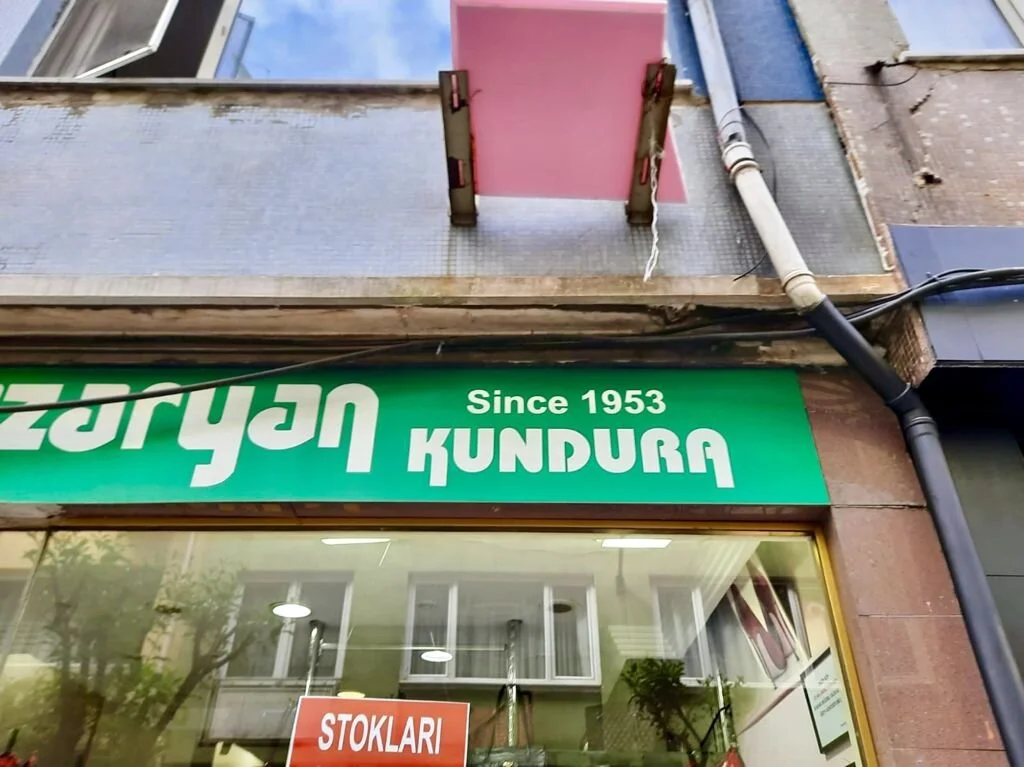
κουντουράς/kundurás
Istanbul Greek Idiom #22: In Greece the shoemaker is τσαγκάρης/tsaŋgáris (from Persian), while in Istanbul Greek it is κουντουράς/kundurás or κουντουρατζής/kunduratzís from the Byzantine κούντουρα/kúndura (shoes). Turkish also uses the Byzantine words kundura & kunduracı.

μνίσκω/mnísko
Istanbul Greek Idiom #23: “Where do you live?” is not “πού μένεις;/pú ménis?” as in Greece, but ” πού μνίσκεις;/pú mnískis?” The Byzantine verb μνίσκω is a derivative of μένω and is used for long-term living/inhabiting (μένω, on the other hand, is used for short term staying).

πάστρα/pástra
Istanbul Greek Idiom #24: Πάστρα/pástra=housecleaning; παστρεύω/pastrévo=to clean; παστρικιά/pastrikiá=clean woman. All come from the word σπάρτo/spárto/spartium junceum, from which brooms where made. Note: pastrikiá can mean prostitute (because good girls don’t shower too much).

γιαλί/yalí
Whatever it is, the way you tell your story online can Istanbul Greek Idiom #25: Α mansion on the shores of the Bosporus is called γιαλί/yalí. The word descends from the Ancient Greek αιγιαλός/eyialós (seashore) and has passed into Turkish as yalı. Photo: Tophane Müşiri Zeki Paşa Yalısı in Rumeli Hisarı.

ταχτάκι/tahtáki
Istanbul Greek Idiom #26: A door knocker in Greece is ρόπτρο/róptro, but in Istanbul Greek it is ταχτάκι/tahtáki, an onomatopoeia of the sound (tak-tak) that the knocker makes. Photo: the door of an 18th-century Levantine köşk on the Bosporus.

τζίβα/tzíva
Istanbul Greek Idiom #27: Τζίβα/tzíva is another name for σπάρτος/spartium junceum, from which brooms were made (see below yellow flowers on a Nişantaşı sidewalk). The word remained in our idiom with the meaning “very clean.” Ex: Θα το κάμω τζίβα= I will make it sparkly clean.
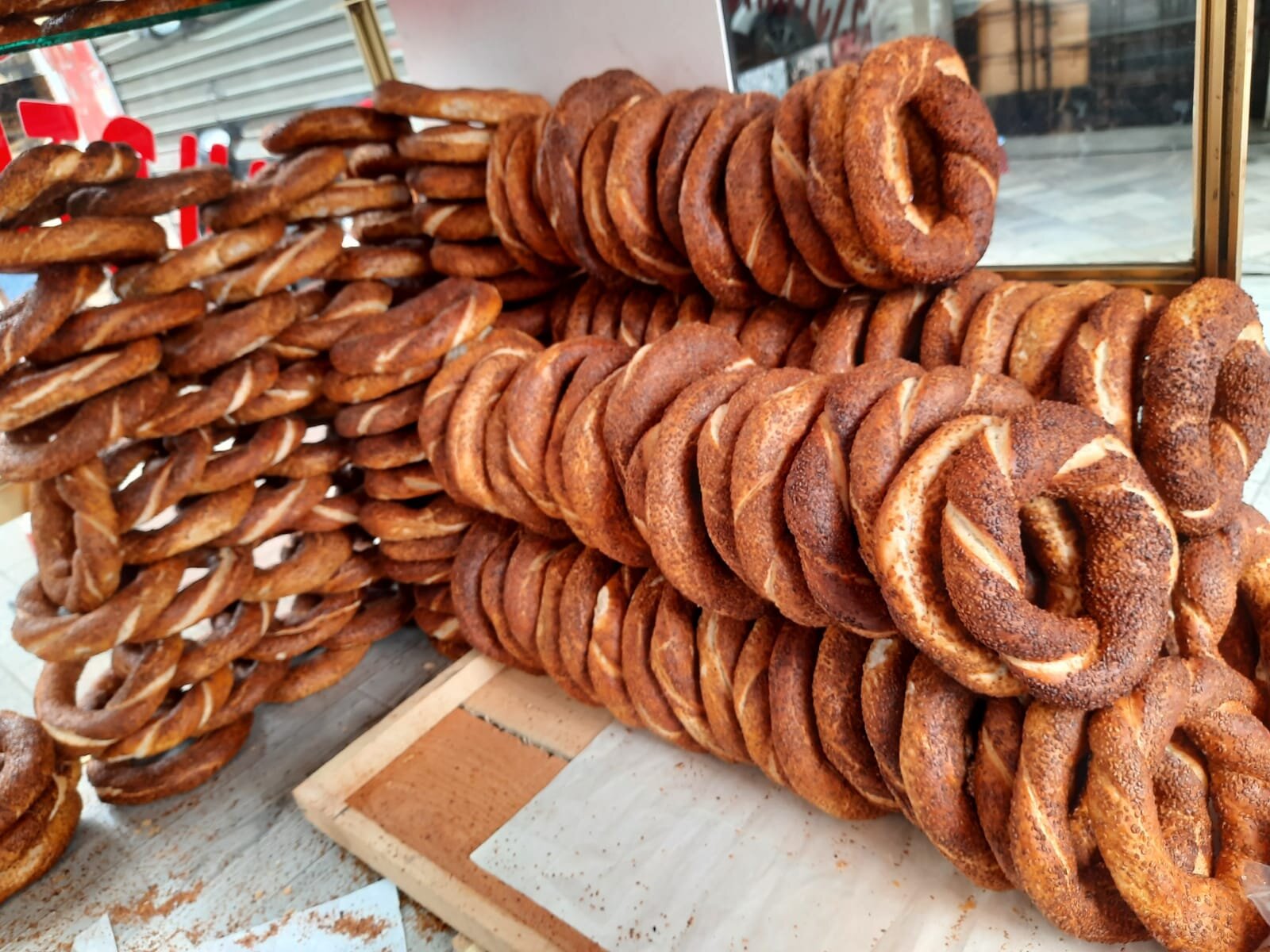
σιμίτι/simíti
Istanbul Greek Idiom #28: The bread ring called κουλούρι/kouloúri in Greece is a σιμίτι/simíti in Istanbul. Simíti may have Persian roots (passed into Turkish as simit), but a more likely possibility is the Ancient Greek σησαμίτης/sisamítis, a sesame-covered bread.

τζαντόγρια/
tzadógria
Istanbul Greek Idiom #29: Τζαντόγρια/tzadógria is one of my favourite Turkish-Greek hybridisms, from the Turkish cadı (witch) and the Greek γριά/griá (old woman), a combination that means “nasty old woman.”

φαγιάνς/fayiáns
Istanbul Greek Idiom #30: Φαγιάνς/fayiáns is the word we use for ceramic tile (called πλακάκια/plakákia in Greece). The word passed into Turkish (as fayans) and Istanbul Greek through French, but its roots are in Faenza, Italy, famous for its glazed pottery.
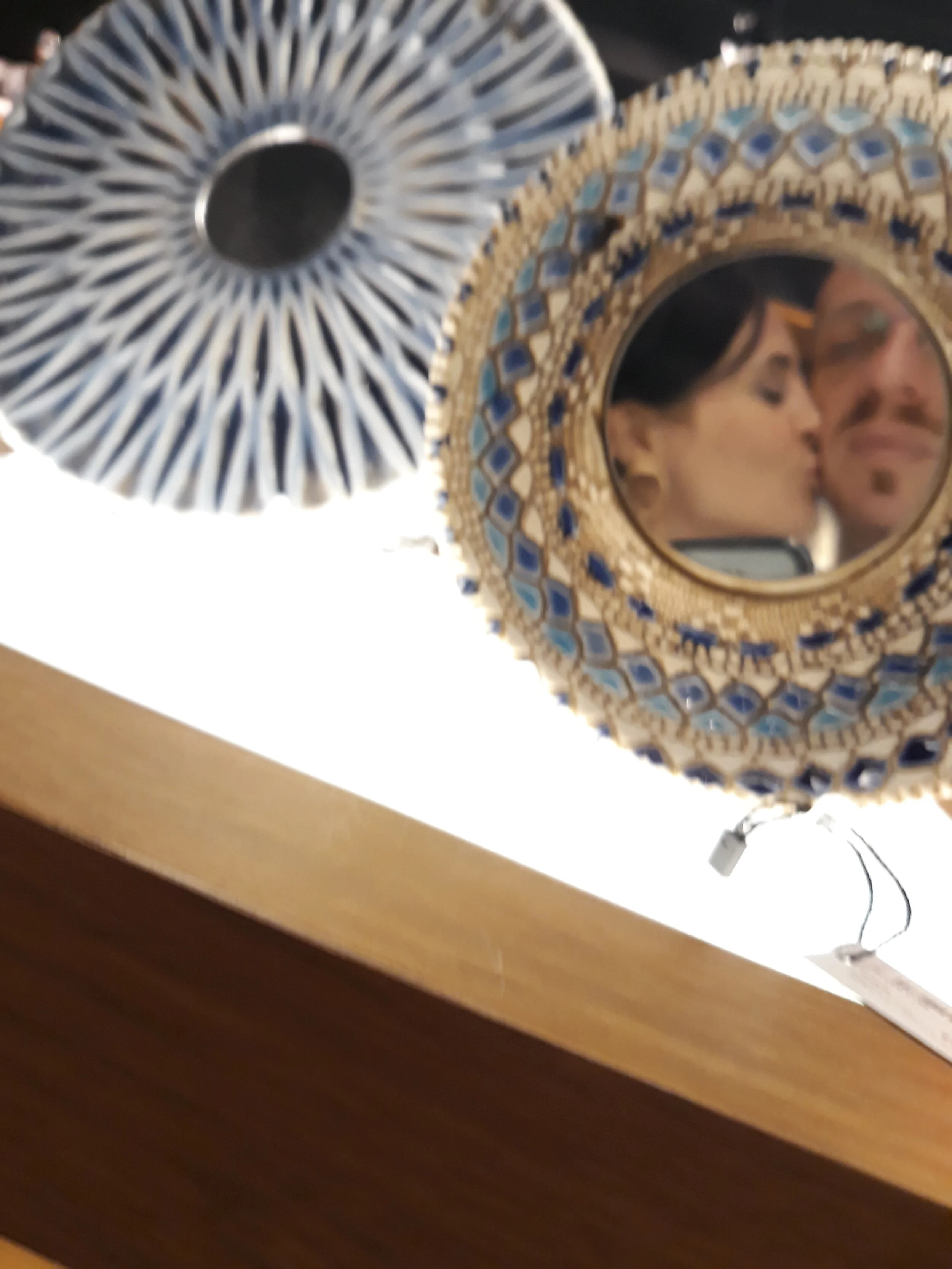
σεβντάς/sevdás
Istanbul Greek Idiom #31: Σεβντάς/sevdás is one of those magical Arabic words that passed into both Turkish (as sevda) & Greek. It means passionate love, often ill-fated or melancholy. Its extreme version is καρασεβντάς/karasevdás, black sevda, a Turko-Arabic hybridism.

τεντζερές/
tendzerés
Istanbul Greek Idiom #32: Although Greece borrowed its word for cooking pot, κατσαρόλα/katsaróla, from the Venetian cazzarola, in Istanbul we use τεντζερές/tendzerés, a word which came into Turkish (tencere) and Istanbul Greek through Persian and/or Arabic.

προσόψι/prosópsi πεσκίρι/peskíri πεστεμάλι/
pestemáli
Istanbul Greek Idiom #33: While πετσέτα/petséta is a towel in Greece (Italian pezzeta), in Istanbul we also use the more old-fashioned προσόψι/prosópsi (Medieval Greek), as well as πεσκίρι/peskíri or πεστεμάλι/pestemáli for hamam towels (from Persian through Turkish).

γιαπράκια/
yaprákia
Istanbul Greek Idiom #34: In Greece, γιαπράκια/yaprákia are meat-stuffed grape or cabbage leaves w/ lemon-egg sauce; in Istanbul, γιαπράκι/yapráki is a grape leaf or a sheet of paper. From the Turkish word yaprak, which is any kind of leaf or sheet of paper.

ρεντές/rendés
Istanbul Greek Idiom #35: In most of Greece a grater is called a τρίφτης/tríftis, but in Istanbul we call it a ρεντές/rendés (from Persian through Turkish). Instead of the verb τρίβω/trívo (when used for grating), we say κάμνω ρεντέ/kámno rendé.

κιτάπι/kitápi
Istanbul Greek Idiom #36: Κιτάπι/kitápi means book in Istanbul Greek (from Arabic kitab through Turkish kitap). In Greece the same word exists, but with a more specific meaning: record, log or account book or archive.

ντούτια/dútia
Istanbul Greek Idiom #37: Mulberries (& generic berries) are μούρα/moúra in Greece; in Istanbul they are ντούτια/dútia, from Arabic tut through Turkish dut. One of the great pleasures of Istanbul in June, as long as you don’t slip on those fallen from trees.

μαϊντανός/
maïndanós
Istanbul Greek Idiom #38: Parsely in Ancient Greek was πετροσέλινο/petrosélino, but because it flourished in Macedonia, it became known as μακεδονήσιον/makedonísion. The word was borrowed into Turkish as maydanoz & reborrowed into Greek (Istanbul & Greece) as μαϊντανός/maïndanós.

μπογιατζής/
boyadzís
Istanbul Greek Idiom #39: We call a shoeshiner (or wall painter) a μπογιατζής/boyadzís (from Turkish boyacı). Λούστρος/loústros, the word used in Greece, fell out of use when the Greeks took to shining their own shoes. Ιn Istanbul, however, the boyadzís lives on.

εβραίικα αυγά/evréïka avgá
Istanbul Greek Idiom #40: Huevos haminados-eggs boiled all night until they brown-are a traditional Sephardic Shabbat dish. The Rum neighbours of the Jews who cooked huevos haminados came to call all overboiled eggs εβραίικα αυγά/evréika avgá: Jewish eggs. Term still used today.

σεμιζότι/semizóti
Istanbul Greek Idiom #41: Σεμιζότι/semizóti (from the Turkish semizotu) is another Istanbul delight in June, especially as salad with yoghurt and garlic sauce. It is called γλιστρίδα/glistrídha in Greece, where it is comparatively overlooked (except by Pontian grandmas).

τσατάλι/tsatáli
Istanbul Greek Idiom #42: Τσατάλι/tsatáli is a slingshot (from Turkish çatal, which today means fork but used to mean pitchfork or an object in a Y-shape). Τσατάλα/tsatála is used in Northern Greece for slingshot; in Southern Greece, they are σφεντόνες/sfendónes.

καΐσια/kaísia
Istanbul Greek Idiom #43: A fruit with a tangled past. Called βερίκοκα/veríkoka in Greece (related to Latin/Greek praecocia/πραικόκια which passed into Arabic as berkuk & then on to Europe); called simply καΐσια/kaísia in Istanbul (from Arabic kaysi through Turkish kayısı).

νανές/nanés
Istanbul Greek Idiom #44: In Istanbul we use the musical word νανές/nanés, from Arabic nana through Turkish nane, for spearmint; in Greece δυόσμος/diósmos, from Ancient ηδύοσμος/idíosmos, meaning “that which smells sweetly”… especially at the pazar on a rainy Istanbul morning.

ρεγάλο/regálo
Istanbul Greek Idiom #45: While in Greece a gift is a δώρο/dóro, in Istanbul we call it a ρεγάλο/regálo, from the Italian. Photo: the best regalo of all, fresh rose jam.

μισίρι/misíri
Istanbul Greek Idiom #46: We call corn μισίρι/misíri, from Arabic Miṣr through Turkish Mısır, meaning “Egypt” (corn was referred to as Egyptian wheat). Greece uses the Albanian-rooted word καλαμπόκι/kalambóki, but its official name is αραβόσιτος/aravósitos, meaning Arab wheat.
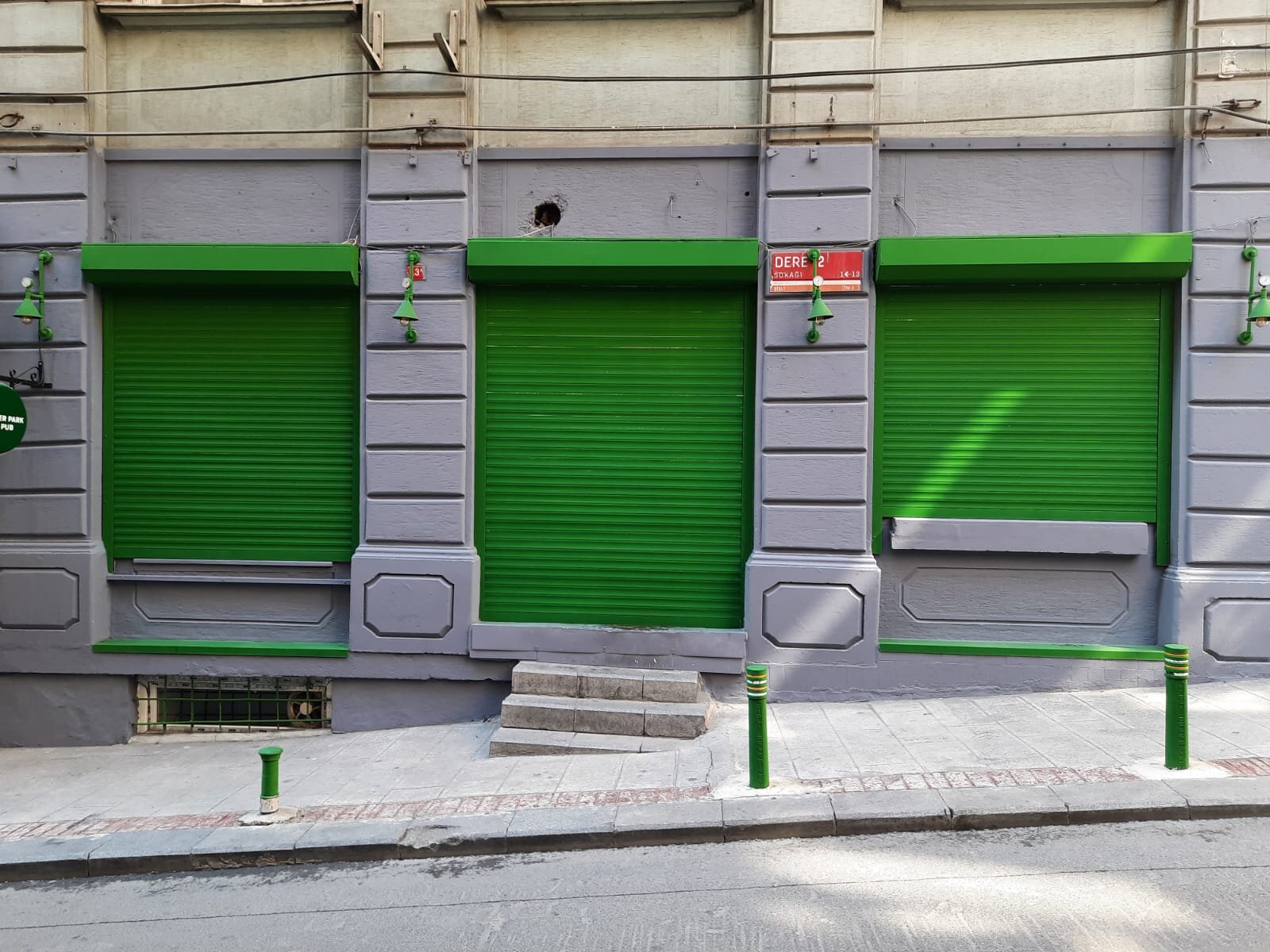
κεπέγκια/kepéngia
Istanbul Greek Idiom #47: We call roll-down shutters κεπέγκια/kepéngia, from Turkish kepenk (in Greece ρολά/rolá from Venetian rolo). Κατεβάζω κεπέγκια/katevázo kepéngia (“I lower the shutters”) means to go bankrupt…which fortunately has not happened to this place.

καλντερίμι/
kalderími
Istanbul Greek Idiom #48: Cobblestone is καλντερίμι/kalderími, from Turkish kaldırım. We also use the Turko-Arabic hybrid καλντερίμ μουχεντίσης/kaldirím mouhendísis (kaldırım mühendisi/sidewalk engineer) for loafers and idlers.

μάσκαρα/máskara
Istanbul Greek Idiom #49: While in Greece mask is μάσκα/máska from Italian masca, in Istanbul it is μάσκαρα/máskara from Ladino maskara (in Greece, however, μάσκαρα/máskara is the eyelash cosmetic).

καλέμι/kalémi
Istanbul Greek Idiom #50: Τhe Greeks reborrowed στυλός/stylós from the French who borrowed Greek στυλογράφος/stylοgráfos, but we use the Mediterranean traveller καλέμι/kalémi from Turkish kalem, from Arabic kalam, from Ancient Greek κάλαμος/kálamos.

τσουμπούσι/ tsoumboúsi
Istanbul Greek Idiom #54: Τσουμπούσι/ tsoumboúsi (pronounced τσιμπούσι/tsimboúsi in Greece) is a party with plenty of food & sometimes song & dance. Most likely from Ancient Greek συμπόσιο/sympósio (Turkish çümbüş & Persian cunbīş from same).
Photo: Yeniköy Panayia

φαγί/fayí, φαγιά/fayiá
Istanbul Greek Idiom #52: Whereas in Greece the most common word for food is φαγητό/fayitó, we use the word φαγί/fayí, plural φαγιά/fayiá.
Photo: Τα φαγιά/ta fayiá prepared by the lovely ladies of Yeniköy Panayia for a community banquet in honour of the Ecumenical Patriarch Bartholomew.

τσαρσί/tsarsí
Istanbul Greek Idiom #53:While the τσαρσί/tsarsí to Greeks (at least those who have visited Istanbul) denotes the Grand Bazaar or Kapalıçarşı, for Istanbul Rums a τσαρσί/tsarsí is any street or neighbourhood with shops (from Turkish çarşı from Persian çārsū meaning crossroads).
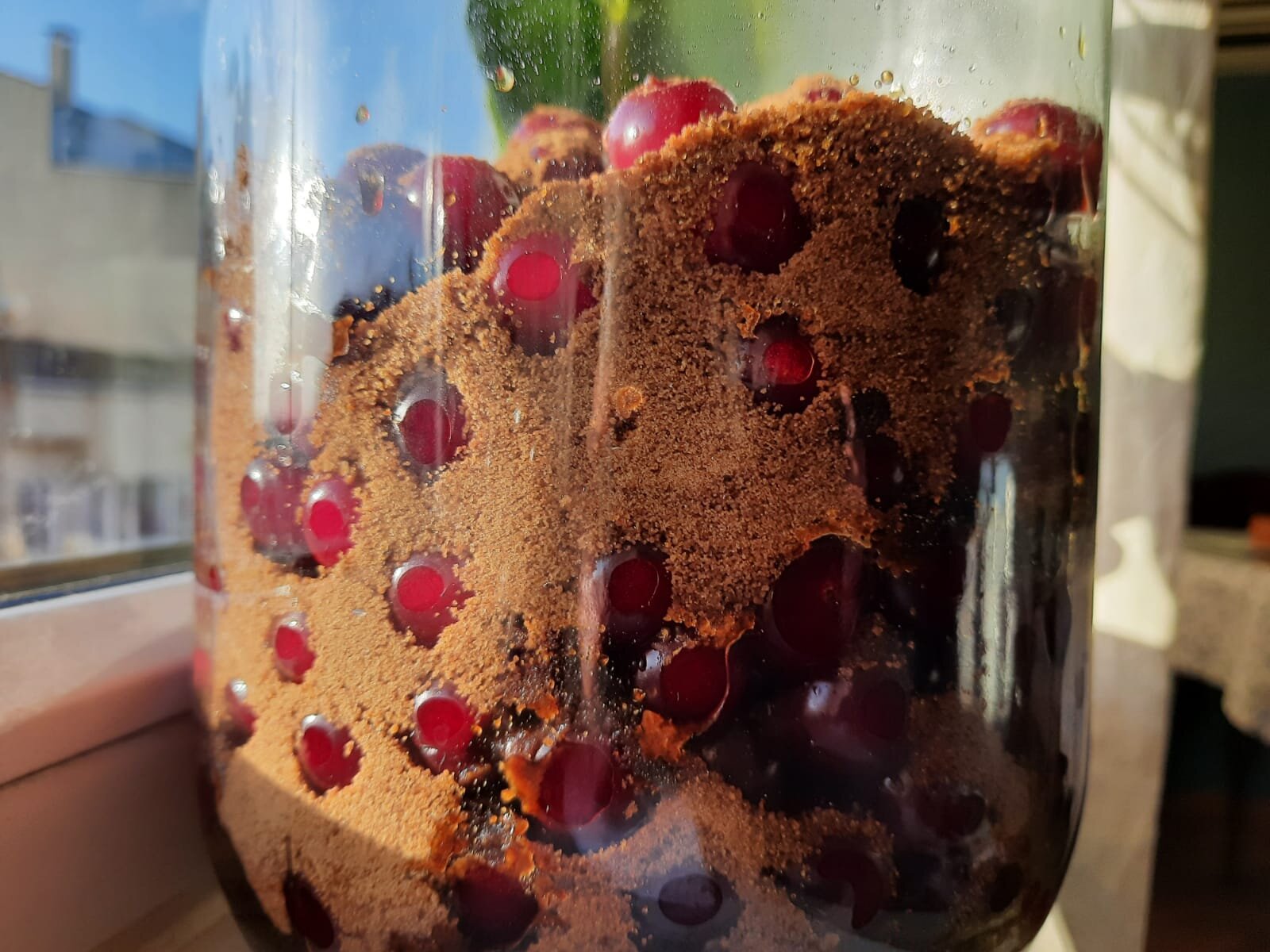
καβανόζι/kavanózi
Istanbul Greek Idiom #54: Whereas Greece uses the word βάζο/vázo (from Italian vaso) for jar, we use καβανόζι/kavanózi (reborrowed from Turkish kavanoz, borrowed from Byzantine γάβενος/gávenos). Photo: this year’s sour cherry (βύσσινο/vişne) liqueur brewing in a giant kavanózi.

όρνιθα/órnitha
Istanbul Greek Idiom #55: Live chickens are κότες/kótes but Greeks call slaughtered chicken κοτόπουλο/kotópoulo while we call it όρνιθα/órnitha or πουλί/poulí (latter: bird or male genitals in Greece). Confusion has arisen when Rum ladies have requested poulí at Athens butchers.

αραμπάς/arabás
Istanbul Greek Idiom #56: We call a horse-drawn carriage αραμπάς/arabás (from Turkish araba). We use the Central Greek word for horse (άλογο/álogo), but we use the literary plural αλόγατα/alógata. Άτι/áti, war horse, entered Medieval Greek from Turkish at (horse).

γιαβρί/yiavrí
Istanbul Greek Idiom #57: We call a baby γιαβρί/yiavrí from Turkish yavru. In Greece you’ll hear the term of endearment μωρό μου/moró mou, but in Istanbul we say γιαβρί μου/yiavrí mou.
Photo: Our yiavrí at three months old.

μπαχτσές/ bahtsés
Istanbul Greek Idiom #58: Whereas Central Greek usually uses the word κήπος/kípos for garden, we use μπαχτσές/ bahtsés, which we pronounce bah-chés (from Turkish bahçe from Persian bāġçe). Video: the bahchés of St. Dimitrios, Büyükada (Πρίγκηπος) this morning.

ντούζικο/dúziko
Istanbul Greek Idiom #59: We call the apéritif ouzo ντούζικο/doúziko. According to Dr. Matthew John Hadodo, the number 12 (douze in French) used to be written on boxes of the drink, thus the Franco-Greek name doúziko.

φασούλια/fasúlia
Istanbul Greek Idiom #60: Whereas Greece calls beans φασόλια/fasólia, we call them φασούλια/fasúlia (from Ancient Greek φάσηλος/fásilon or φασίολος/fasíolos). Our version of the word passed into Turkish as fasulye.
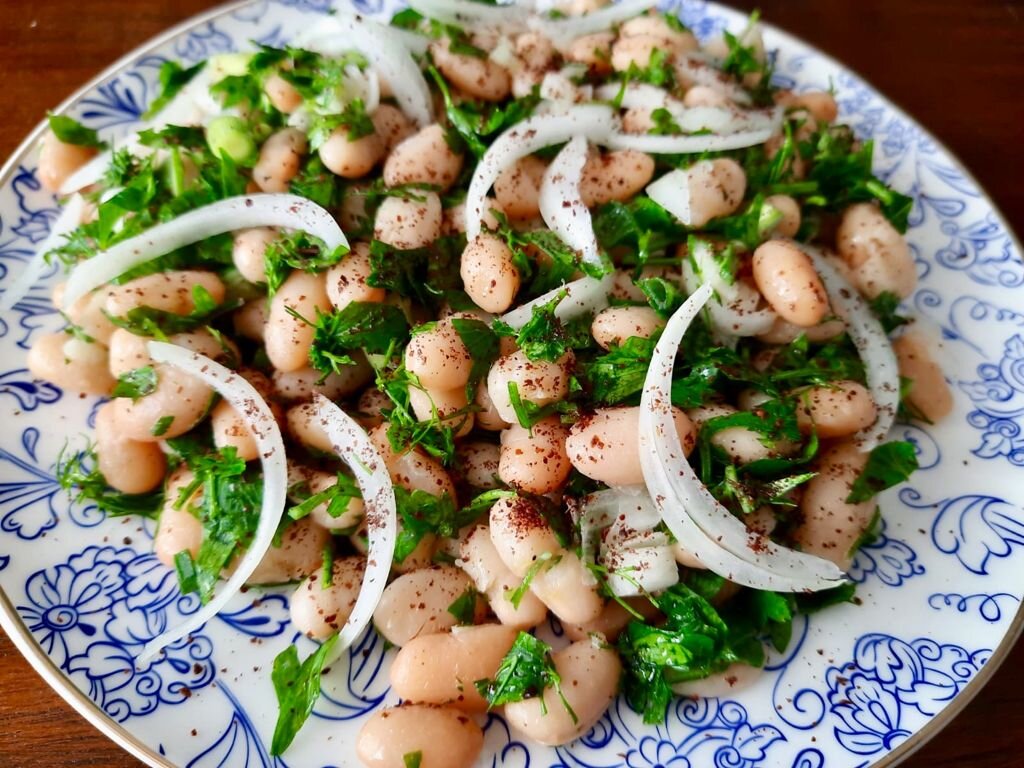
πιάζι/piázi
Istanbul Greek Idiom #61: Πιάζι/piázi (from Turkish piyaz from Persian piyaz, which means onion) is a typical Istanbul dish made from white beans, parsley, onion, salt and sometimes other herbs and boiled egg. In our dialect πιάζι/piázi also means flattery, as in Turkish.
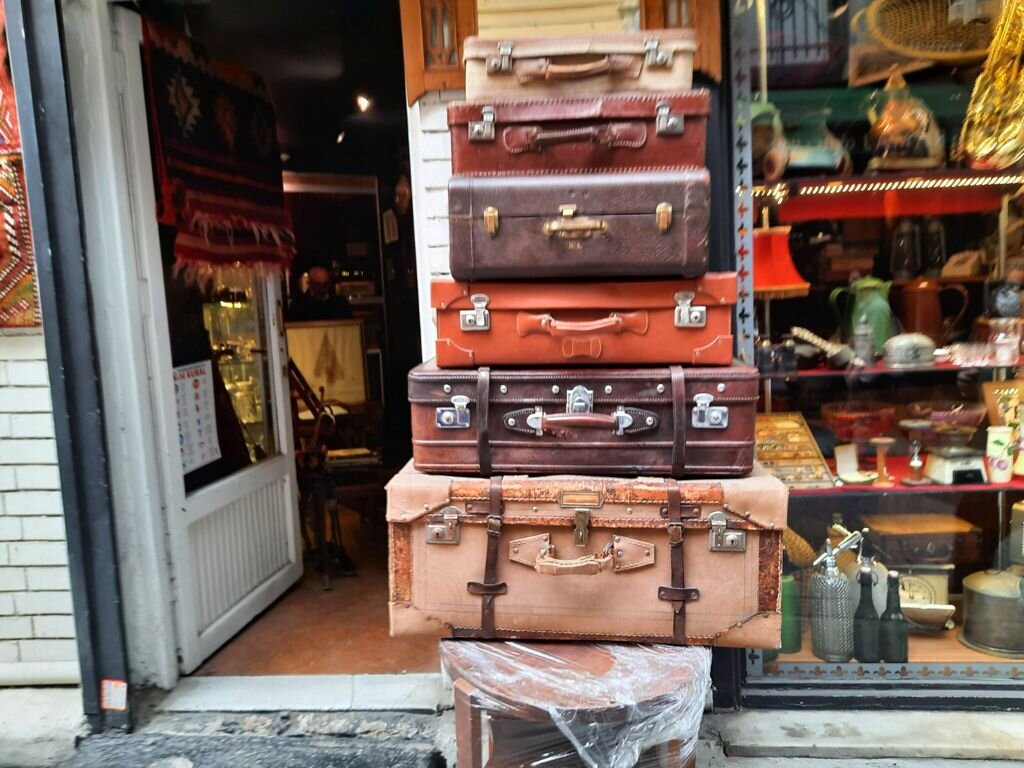
γκιουμρούκι/giumrúki
Istanbul Greek Idiom #62: We call a customshouse γκιουμρούκι/giumrúki, from Turkish gümrük from Medieval Greek κουμμέρκιον/kummérkion (customshouse or customs duties in Byzantium) from Latin commercium (trade). Γιουμρούκι/giumrúki also means customs duties.

καραμφίλι/karamfíli
Istanbul Greek Idiom #63: Γαρύφαλλο/garyfallo in Central Greek, καραμφίλι/karamfíli in Istanbul Greek & karanfil in Turkish (all from Ancient καρυόφυλλον/karyófyllon) mean both clove & carnation. In Istanbul we also use μοσχοκάρφι/moshokárfi for clove, but not for carnation.
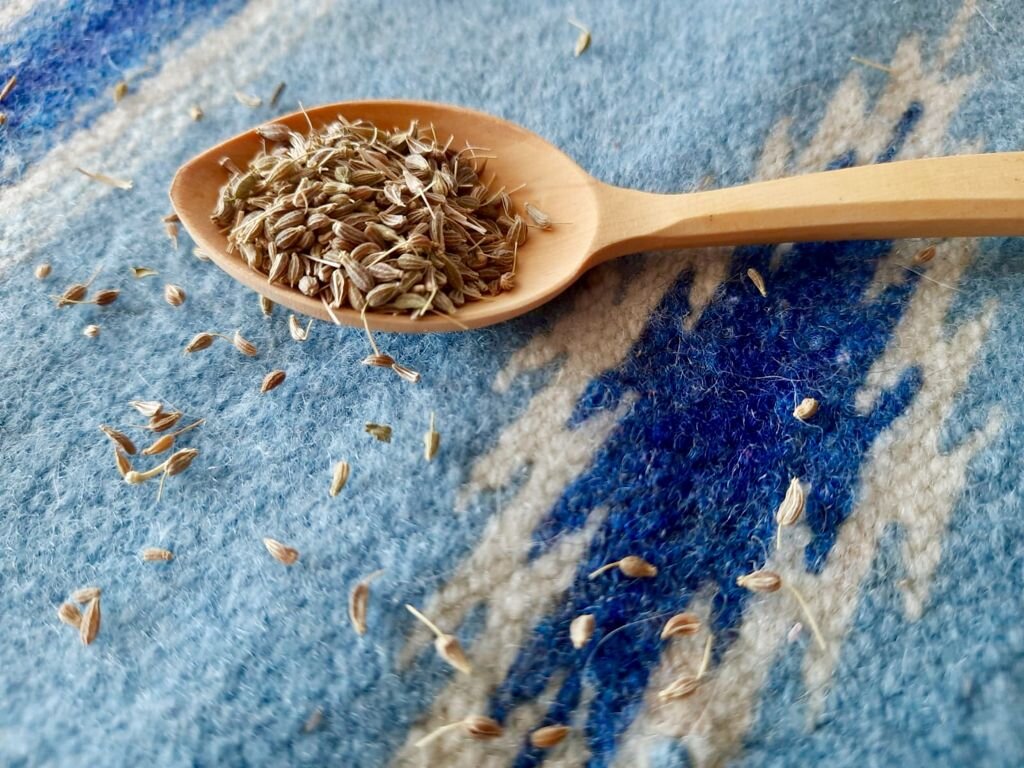
ανασόνι/anasóni
Istanbul Greek Idiom #64: We call anise ανασόνι/anasóni, from Ancient Greek άνισον/ánison. Central Greek’s version of the word adds the prefix γλυκ/glyk to make γλυκάνισο/glykániso (sweet anise), while the Turkish version is closer to ours (and to the Ancient Greek): anason.

κιλίφι/kilífi
Istanbul Greek Idiom #65: Whereas pillowcase in Central Greek is μαξιλαροθήκη/maxilarothíki, we call it κιλίφι/kilífi, from Ancient Greek κελύφιον/kelyfion. Although some say that the Turkish word kılıf comes from Arabic, we believe that it also derives from κελύφιον/kelyfion.
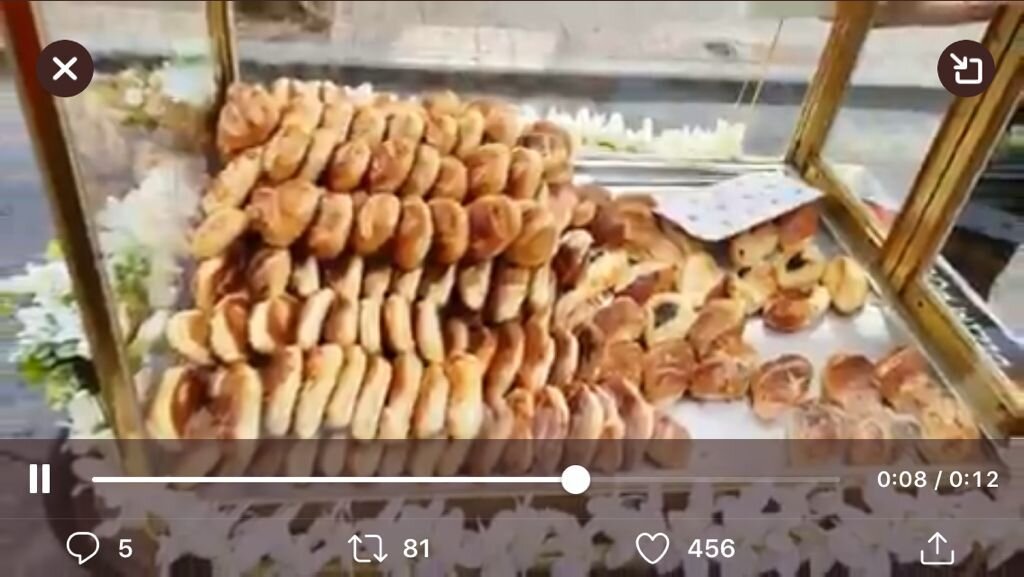
μπουγάτσα/bougátsa
Istanbul Greek Idiom #66: Although Athenians use the word μπουγάτσα/bougátsa (from Turkish poğaça from Italian focaccia) for a sweet cream-filled pastry, we use it for savory pastries filled with cheese or meat.
Listen to the call of an Istanbul μπουγατσατζής/bougatsatzís

κόχη/kóhi
Istanbul Greek Idiom #67: A corner is γωνία/gonía in Central Greek, but in Istanbul we use the medieval word κόχη/kóhi (from Ancient Greek κόγχη/ kóghi, which meant corner, curve or niche). Photo: Serpuş Han in Galata, built in 18th-century on existing Genoese structure.

μπαντέμια/badémia
Istanbul Greek Idiom #68: We call almonds μπαντέμια/badémia, from Turkish badem from Persian badam; and we call ice μπούζι/búzi, from Turkish buz. Photo: Buzlu badem (iced almonds), a specialty of Istanbul meyhanes, accompanied by a glass of ντούζικο/dúziko (see #59).

Ίσιος Δρόμος/Ísios Drómos
or
Μεγάλη Οδός/ Megáli Odós
Istanbul Greek Idiom #69: The Cadde-i Kebir in Ottoman Turkish, the Grand Rue de Péra in French, İstiklal Caddesi in Modern Turkish, and the Ίσιος Δρόμος/Ísios Drómos/Straight Road or Μεγάλη Οδός/ Megáli Odós/Grand Street in Istanbul Greek.

Μιμάρης/mimáris (m)
or
μιμάρισσα/mimárissa (f)
Istanbul Greek Idiom #70: Μιμάρης/mimáris (m) or μιμάρισσα/mimárissa (f) is our word for architect (from Turkish mimar from Arabic معمار. Looking closely at Istanbul’s heritage buildings, one finds that many were built by Rum μιμάρηδες/mimárides (plural).

τζούμπα/ʤúmba
Istanbul Greek Idiom #71: An oriel window, one of the most characteristic elements of Istanbul architecture, is called an εξώστης/eksóstis in Central Greek but a τζούμπα/ʤúmba in Istanbul Greek (from Turkish cumba, possibly from Italian gibbo). Photo: Halep Pasajı (Cité d’Alep)

ασλάνι/asláni
Istanbul Greek Idiom #72: Whereas lion in Central Greek is λεοντάρι/leondári, we use the word ασλάνι/asláni, from Turkish aslan. Aσλάνι/asláni is also a strong or brave person. Photo: Detail of bishop’s throne at St. Dimitrios, Büyükada.

σεκλέτι/sekléti
Istanbul Greek Idiom #73: Σεκλέτι/sekléti means distress, sorrow or longing pain (from Turkish sıklet, meaning heaviness, from Arabic ثِقلة). We also have the verb σεκλεντίζομαι/seklendízome, which means to suffer, to be upset, or to be tortured.

σκάλα/skála
Istanbul Greek Idiom #74: A quay is αποβάθρα/apováthra in Central Greek but σκάλα/skála in Istanbul Greek. Both σκάλα/skála and the Turkish word iskele come from the Italian scala.
Photo: The σκάλα/scala/iskele of Bostancı.

ντεμίρι/demíri
Istanbul Greek Idiom #75: Iron is σίδερο/sídero in Central Greek but ντεμίρι/demíri in Istanbul Greek (from Turkish demir). Ντεμιρτζής/demirdzís is an ironmonger in Istanbul Greek; in Greece, the word survives as a common surname, along with Ντεμιρτζόγλου/Demirdzóglu.

απίδι/apídi
Istanbul Greek Idiom #76: A pear is αχλάδι/ahládi in Central Greek but απίδι/apídi in Istanbul Greek (from Hellenistic ἀπίδιον/apídion from Ancient ἄπιον/ápion).

ινάτι/ináti
Istanbul Greek Idiom #77: Obstinacy in Istanbul Greek is ινάτι/ináti (from Turkish inat from Arabic عناد). The word exists as γινάτι/yináti in Central Greek, but it is rarely used and close to being lost.
Watch the Video: doing ινάτια/inátia (plural) when it’s time to come in from a walk.





















